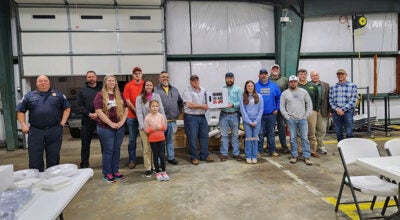Hitting the road for a shot at boosting vaccines
Published 8:04 pm Friday, September 3, 2021
|
Getting your Trinity Audio player ready...
|
Cindy Williams is using gentle but persistent persuasion to try to win over people to take the COVID-19 vaccine.
She and a team of Riverside Health System officials spent three days last week at Smithfield Foods at the company’s request to provide information about the vaccine and get more to take it. They set up a tent near the employee entrance to provide the vaccine, and on Friday, they were providing the one-shot Johnson & Johnson and the two-dose Pfizer-BioNTech vaccines to people.
Williams, vice president and chief pharmacy officer with Riverside, has been making the rounds with different businesses and organizations across areas of Western Tidewater and Hampton Roads trying to convince people to get vaccinated, and then putting shots in arms, as vaccination rates across the region have lagged behind the state. Though 56.6% statewide are fully vaccinated, Southampton County has the lowest rate in Western Tidewater at just 40%, with Suffolk (44.3%), Franklin (45.5%), Surry County (48.4%) and Isle of Wight County (50.2%) having better rates but still trailing the state.
“Certainly we’ve been able to get some additional folks vaccinated today, so that’s been worthwhile,” Williams said.
While some of the Smithfield employees didn’t hesitate in getting the vaccine, others took time to think about it, and then got vaccinated later in the week. Others ultimately chose not to get it.
Riverside worked for the past couple of months to prepare for a vaccine mandate for its employees that it rolled out in tandem with Sentara Healthcare, Chesapeake Regional Hospital and Children’s Hospital of the King’s Daughters. Bon Secours announced separately it would also have a vaccine mandate for its employees.
Williams said Riverside’s focus is on answering questions and addressing the concerns of its employees.
“Obviously the VA (Veterans’ Administration) was a little ahead of us because of the federal mandate,” Williams said, “but we were also wanting to make sure that we were taking our team members’ concerns into account, and felt that we really need to time any requirement after, at least, one of the vaccines became FDA approved.”
She said Riverside’s issues with vaccine hesitancy have been no different than that of the general public, with some waiting for full Food and Drug Administration approval. At a vaccine clinic last week, Williams saw the direct result of the announcement — more got vaccinated as a result.
“I was doing a vaccine clinic (last) Monday … when the announcement came out,” Williams said, “and several people at that clinic said, ‘You know what? When I walked into the education session, I wasn’t thinking about getting a vaccine today. Now that I know it’s fully FDA approved, that’s what I’ve been waiting for, and now I’m going to go ahead and get that vaccine today.’”
Williams acknowledged that between the Delta variant and the increase in positive COVID-19 cases — Western Tidewater has a 7-day positivity rate of 14.8% — along with mandates from employers, universities and other organizations, it has sparked at least a small uptick in those willing to get vaccinated.
“I think it’s going to be a combination of individuals that were waiting for full approval,” Williams said. “I think it’s going to be individuals that may work for employers that are saying now that we’ve got an approved vaccine, we’re going to make it a requirement, and I also think that it may be people looking at what’s happening with Delta and seeing that even though we may be having some breakthrough cases, that the breakthrough cases are pretty mild and pretty low, and that most of the infections that we’re seeing today are happening amongst the unvaccinated. I think the landscape is a little bit different with Delta and I think that is making some people reconsider, is now the time to get vaccinated?”
She said the biggest group of people to convince are those between 20 and 40 years old who assume that because they are young and healthy, they either won’t get COVID-19 or if they do, it will be a mild case.
However, she noted that two people in their early 20s from Hampton had died last week, and another 32-year old man from Suffolk died earlier this month — all from COVID-19.
In her educational sessions last week, Williams tried to underscore the possible health issues for those who end up with long-COVID. A man at one of her sessions challenged her by saying not everyone who gets COVID-19 dies, which she acknowledged as true. But in turn, she told him that the virus is also having damaging effects long after its initial onset.
One woman Williams talked with still has lingering memory problems from COVID-19 six months later, and another told her after having COVID-19 that she developed blood clots and is still recovering from that.
“What some people are missing is that it’s not just about dying,” Williams said. “It’s about, maybe, other long-term health risks, and we know that the long-term health risks from COVID are much higher and much more severe than any potentially rare side effect that you might get from the vaccine.”
Williams also pointed to the start of college football season, Labor Day and back-to-school as possible superspreader-type events for the virus, especially with those under 12 still not able to get a vaccine until at least late September at the earliest.
“I think the issue this year is the Delta variant, right? We know that’s over 90% of the cases in Virginia,” Williams said. “We know it’s more contagious than the variant that was around last year. And so I think that’s really the problem right now, that we don’t know, is how is that going to impact back-to-school, especially the younger kids, who cannot get vaccinated yet?”
She also noted that the University of Virginia’s online modeling shows another peak of the virus at higher than January and February levels by next month. She said that while hospital beds and intensive care units are not currently full, it could be “one of the unintended consequences” if COVID-19 cases continue to rise. Williams said other hospitals around Virginia, however, are full.
“We’re not at that place in Hampton Roads,” Williams said, “but we have other emergencies that we need to take care of, and having a lot of COVID patients just makes that more difficult.”




